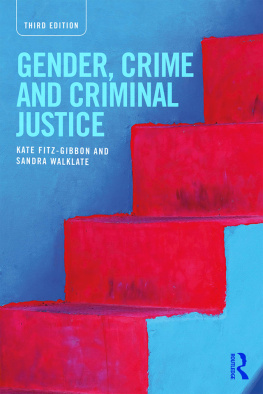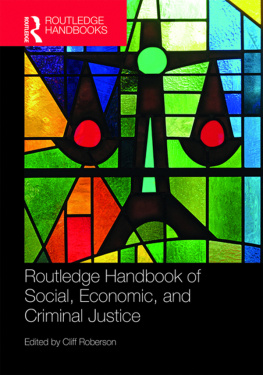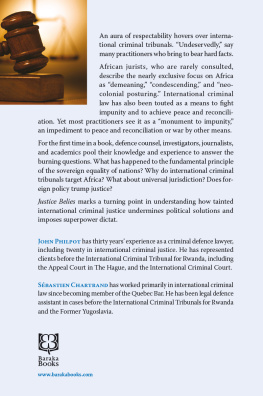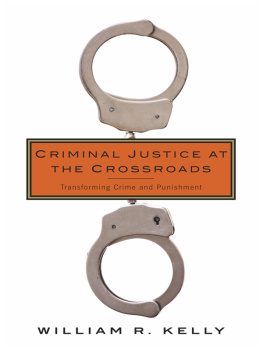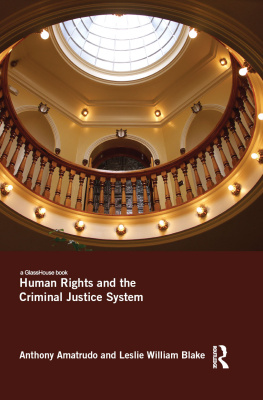International and Comparative
Criminal Justice
This book explores the growing internationalisation of criminal justice as a phenomenon of global governance and provides students with a critical understanding of the increasing establishment of international institutions for regulating transnational crime, the development of alternative justice processes across the globe, and international co-operation and supra-national developments in areas of criminal justice policies and practices. Key topics covered include:
the historical development of international criminal justice institutions and traditions
international restorative justice
victim communities and collaborative justice
the relationship between crime and war
international human rights
the war on terror
the globalisation of crime and control
international developments in policing
the International Criminal Court
international criminal law.
International and Comparative Criminal Justice will familiarise students with the literature and debates relating to the field of international criminal justice and appreciates their theoretical and policy context. In doing so, it encourages students to assess the strengths and weaknesses of different approaches to the study of international developments and the analysis of comparative policy convergence and research. It will also help students to analyse and communicate in an informed and critical way theoretical accounts and empirical studies within the field of international criminal justice.
This book is essential reading for upper-level undergraduates taking courses in criminal law, international relations and governance, and postgraduates engaged in international criminal justice, international law, regulation and governance, and human rights.
Mark Findlay is Deputy Director of the Institute of Criminology at the University of Sydney; Professor of Law, Singapore Management University; until recently Professor of International Criminal Justice, University of Leeds; and a Senior Associate Research Fellow at the Institute of Advanced Legal Studies, University of London. Professor Findlay is a barrister of the Supreme Court of New South Wales and has worked as a research consultant for international agencies, governments and private consortia in many jurisdictions.
International and
Comparative
Criminal Justice
A critical introduction
Mark Findlay
with Louise Boon Kuo and Lim Si Wei
First published 2013
by Routledge
2 Park Square, Milton Park, Abingdon, Oxon, OX14 4RN
Simultaneously published in the USA and Canada
by Routledge
711 Third Avenue, New York, NY 10017
Routledge is an imprint of the Taylor & Francis Group, an informa business
2013 Mark Findlay, Louise Boon Kuo and Lim Si Wei
The right of Mark Findlay, Louise Boon Kuo and Lim Si Wei to be identified as authors of this work has been asserted in accordance with sections 77 and 78 of the Copyright, Designsand Patents Act 1988.
All rights reserved. No part of this book may be reprinted or reproduced or utilised in any form or by any electronic, mechanical, or other means, now known or hereafter invented, including photocopying and recording, or in any information storage or retrieval system, without permission in writing from the publishers.
British Library Cataloguing in Publication Data
A catalogue record for this book is available from the British Library
Library of Congress Cataloging-in-Publication Data
A catalog record for this book has been requested
ISBN13: 978-0-415-68869-7 (hbk)
ISBN13: 978-0-415-68871-0 (pbk)
ISBN13: 978-0-203-08328-4 (ebk)
Typeset in Joanna by
Cenveo Publisher Services
The Case for International Criminal Justice
Controversy surrounding the conviction of Charles Taylor, former President of Liberia, by the Special Criminal Court for Sierra Leone, represents in microcosm the polarised views about international criminal justice (ICJ) and its merits. In an article entitled Imperialism didnt end. These days it is known as international law', the Guardian columnist George Monbiot drew these conclusions from the verdict:
The conviction of Charles Taylor is said to have sent an unequivocal message to current leaders: that great office confers no immunity. In fact it sent two messages: if you run a small, weak nation, you may be subject to the full force of international law; if you run a powerful nation, you have nothing to fear.
Alleged over-politicisation is not a new critique of the formal institutions and processes of international criminal justice. Monbiot is voicing the reservations of many that the end to impunity, said to be offered through prosecution before international criminal courts and tribunals, is entirely dependent on geo-political significance and hegemonic immunity.
The British Foreign Secretary, William Hague, claimed that Taylor's conviction demonstrates that those who have committed the most serious of crimes can and will be held to account for their actions. Critics such as Monbiot explain, consistent with the assertion of politically biased international criminal justice:
This is because the powerful nations, for obvious reasons, are procrastinating. Nor have the United Kingdom, the United States and other Western nations incorporated the crime of aggression into their own legislation. International law remains an imperial project, in which only the crimes committed by vassal states are punished.
In addressing the UN General Assembly concerning the ICC's first verdict (against Thomas Lubanga, of the Congolese Republic), the President of Zimbabwe, Robert Mugabe said:
The leaders of the powerful Western states guilty of international crimes, like Bush and Blair, are routinely given the blind eye. Such selective justice has eroded the credibility of the ICC on the African continent.
The postcolonial odour of international criminal justice hangs heavy around the allegations that in its earliest prosecutions the ICC revealed an unbalanced concern for crimes in South world African states. The magazine New African quipped that the problem lay with being a dictator in the wrong continent at the wrong time.
One suggested remedy for the complaints levelled at the ICC in apparently focusing too much on African cases is the more universal ratification of the court's statute. A wider member state mandate, the ICC President recently argued, would give the court jurisdiction over atrocities no matter where they happen and remove some of the technical hurdles constraining the court's case selection. Until more expansive ratification is achieved, the UN Security Council's (UNSC) power to refer country situations to the court will remain crucial to its geo-political priorities. However, the obvious political motivations behind the exercise of this hegemonic power indicates that it is unrealistic to assume that the UNSC in its referrals will apply the same criteria, regardless of the country concerned.
In response to the allegations of political motivation behind the exercise of investigation and prosecutorial discretion at the ICC, the new Chief Prosecutor of the court, Fatou Bensouda, from Gambia, speaking in Africa recently, launched a combative defence of the institution, rejecting the view that it is a pro-Western, anti-African court. She told the recent OpenForum conference in Cape Town, South Africa:


